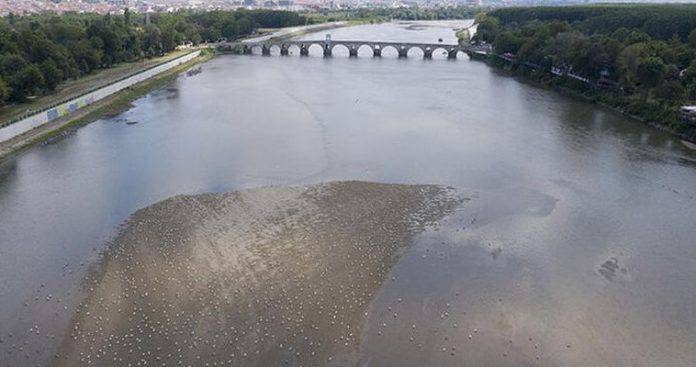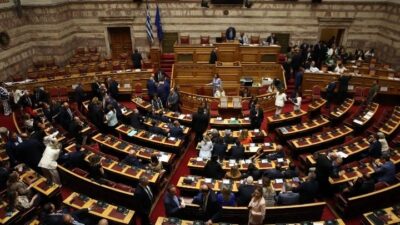George Protopapas: The drought in Turkey is drying up Erdogan politically
04/12/2020
In addition to the serious economic problems and the coronavirus pandemic, Tayyip Erdoγan also has to deal with declining water supplies due to the lack of seasonal rains and the sharp increase in water consumption by citizens living in their homes due to the coronavirus. Erdogan has pointed to the danger of water scarcity, saying “rainfall is 50% lower than in other years” and urged citizens to use water sparingly.
The water situation is considered critical as its levels are lower compared to the previous ten years. The four largest cities, Istanbul, Ankara, Izmir, Bursa, face a significant problem, as their water reservoirs are only 24%, 23%, 36%, and 24% full respectively. In Bursa, local authorities said the city had at most three months of water left.
Istanbul, with a population of about 16 million, is on the verge of consuming, on average, almost one percentage point of water reserves per day, which translates into the fact that water can be depleted within a month. Dursun Gildiz, a former director of the General Directorate of State Water Works, told the Turkish daily Sozcu that Istanbul’s water level may not rise until February.
He pointed out that “Istanbul has water left for a month… There is no short-term solution to this crisis”. The opposition’s Istanbul municipality has called on the government to complete a water pipeline project that will take it to the city, from the Melen River to the nearby town of Sakraya.
Water scarcity is also a major problem for Izmir, where the water level at the Tahtalı Dam dropped to 36.04% compared to 65.29% last year. The same situation is observed at the Kutlu Aktaş dam where its capacity is at 13.36% compared to 49.34% in 2019.
Drought problem
The head of the Chamber of Environmental Engineers in Izmir said that instability in rainfall is “a problem of quantity and quality for water in the province. The outlook is bleak. Authorities are urging people to save water. “60% of the water supply for households comes from groundwater and the rest comes from surface water.”
Izmir Mayor Tudz Sawyer is particularly concerned about the low water levels and called on citizens to be more careful in consuming water. Total water demand in Turkey continues to grow and there is expected to be a major water shortage problem in the coming years. Water availability is estimated to decrease to 1000 m3 in 2050, due to population growth and the effects of climate change.
About 74% of Turkey’s total water supply is used for agricultural irrigation, the remaining 15% and 11% is used for domestic and industrial consumption, respectively. According to studies, Turkey is facing the threat of its water security, compared to European countries.
Turkey is densely populated and most of its regions face high or very high-pressure levels over water shortage. This problem is likely to be exacerbated by population growth and a possible drying up resulting from high temperatures. According to experts, the territory of Turkey will be more affected by the adverse effects of climate change, compared to the territory of other countries.
Dry rivers
Water levels on the Maritsa (Evros) and Tunca rivers in northwestern Turkey have dropped to extremely low levels as the drought continues. Rainfall has halved, and rivers have dried up in the Black Sea region. Experts warn that the non-conservation of forests in the area could worsen the situation.
Now small sand islands appear in the river Maritsa, which starts from Bulgaria, passes through the prefecture of Edirne, where it is the border with Greece, and ends in the Aegean Sea. Tunca also flows from Turkey and ends as a tributary of the Maritsa in Andrianoupolis (Edirne).
According to the State Directorate of Hydraulic Works, the flow rate of the Maritsa River was 222 cubic meters per second two years ago, but this year it dropped to 59 cubic meters. The same goes for the Tunca River, as the flow velocity that was 16 cubic meters per second two years ago, was measured at 2 cubic meters per second, compared to 2019.
Erdogan and public opinion
Tayyip Erdogan is up against public opinion as the problems of the daily survival of the citizens become more and more burdensome. Erdogan already feels the pressure of public opinion, as reflected in two recent polls by Avrasya and AREA.
The ruling Islamist Justice and Development Party (AKP) and its ruling partner Nationalist Action Movement (MHP) show declining popularity. Erdogan’s party shows a 6% to 9.3% drop in its electorate, while that of Devlet Bahceli approaches 2/1% -2.5%.
The acute economic problem, unemployment, the coronavirus pandemic, have dealt a major blow to Erdogan’s profile, which is hotly contested, and scenarios of his successors have returned. The situation is further aggravated by the serious problem of drought facing Turkey, which has to do mainly with climate change, where the question arises whether Erdogan is up to tackling it.





